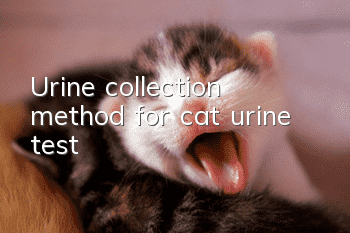Urine collection method for cat urine test

For pet doctors, cat urine is also an indicator of disease. The kidneys are part of the urinary organs, and we all know that the kidneys are an important endocrine organ of the body, so when a cat has endocrine abnormalities, it It will show up through urine, and urine tests can help doctors diagnose the disease.
Urinary abnormalities in cats mainly include color abnormalities and urinary disorders, such as polyuria, oliguria, dysuria, urinary incontinence, etc. Different clinical manifestations may have different locations of lesions. In addition to observing the color, you must also The health of cats can be judged by changes in the components of urine. Before conducting a urine test on cats, we must first collect urine from cats. Generally speaking, there are the following methods for collecting urine from cats.
1. Catheterization
Catheterization should be performed under aseptic conditions as much as possible. Catheterization can avoid most contaminants in the vagina, penile foreskin, and perineum, but it is possible that an unclean urethral opening can contaminate urine. During catheterization, bacteria introduced into the bladder may cause infection of the otherwise healthy lower urinary tract in dogs and cats. The risk of iatrogenic bacterial infection is greater in those cases with pre-existing urinary tract infection. Pushing the catheter too hard can cause the diseased urethra or bladder to rupture. Operational errors can also cause normal urethra and bladder rupture. During catheterization, the presence of a wound will increase red blood cells, proteins, and epithelial cells in the sample.
2. Pressure on the bladder
In principle, it is not recommended to use bladder compression to collect urine. If there is trauma to the urinary system, pressure on the bladder can increase red blood cells and protein in the urine sample. If the animal has urethral obstruction, recent major trauma to the bladder, or a cystotomy, compression of the bladder should not be used to collect urine. Excessive pressure can rupture the bladder, and it is more likely to rupture if the bladder itself is diseased. Forcibly compressing the bladder to collect urine will cause urine to flow back from the bladder back into the ureter, increasing the risk of infection. Contamination of the urethra, vagina, or penis and foreskin must be considered when evaluating urine collected by this method.
3. Natural urination
When using natural urination to collect urine, the middle section of urine is the best, because the initial urine flow will mechanically wash out the dirt in the urethral opening and vagina, or the vaginal meridian and foreskin. Urine samples collected from cages or the ground are inferior, but still very effective if contamination factors are taken into account. But when the contaminant is related to cells, proteins or bacteria, another urine collection method must be used to prove the abnormality in the urine sample. Natural urination is the urine collection method of choice when hematuria is affordable, because other methods will cause bleeding and increase the amount of red blood cells during urine collection.
4. Bladder puncture
Bladder puncture can avoid the urethral opening, vagina, penile foreskin andcontamination from negative pollutants. Recent obstetricotomy and severe bladder trauma preclude routine urine collection by this method. Cystocentesis can minimize non-urethral contamination of urine samples. It is mainly established that trauma caused by the pinhole may cause iatrogenic hematuria and urine from the bladder puncture site into the abdominal cavity.
Urine samples should be sent to the laboratory in containers that are sensitive and free of chemical contamination. The collected urine samples should be analyzed as soon as possible. If they cannot be analyzed within 30 minutes, they should be refrigerated.
- How to train a cat not to go to the table? Get rid of the cat’s habit of jumping on the table!
- How to properly train an American Curl Cat? American Curl Cat Training Methods!
- How long does it take for a Ragdoll cat to adapt to a new environment?
- Why do cats lick their own pads?
- The difference between normal dandruff and cat dandruff
- Why do cats sniff other cats' butts?
- When do cats need to be dewormed internally?
- What causes cats’ ears to become hot?
- What causes a rotten taste in a cat’s mouth?
- What should I do if my cat keeps biting me? Try these solutions!



